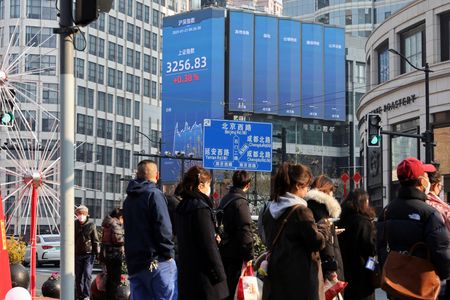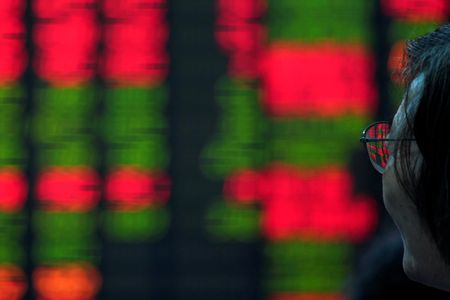By Jiaxing Li
SHANGHAI/HONG KONG (Reuters) -China’s stocks and currency came under pressure as markets returning from a week-long break were greeted by a new trade dispute with the United States and ructions in the global artificial intelligence sector.
Tariffs so far have been less than what the Trump administration had initially indicated and relief was evident in Hong Kong, where Chinese stocks rallied this week.
Meanwhile, enthusiasm around China’s artificial intelligence company DeepSeek bolstered AI stocks.
While investors were taking money off the table, declines have so far been limited with both the bluechip CSI300 and the Shanghai Composite Indexes ending the session roughly 0.6% lower. Investors are now mostly focused on what Beijing might do to bolster confidence.
Kaiyuan Securities analyst Wei Jixing said President Donald Trump’s 10% tariffs on Chinese goods had largely been priced in.
“China’s market will likely overlook the tariff disruptions, as DeepSeek is repairing risk appetite, while investors look forward to more proactive domestic policies,” Wei said, referring to the new low-cost Chinese AI model that stunned markets last week.
China’s central bank on Wednesday set the yuan midpoint at 7.1693 per dollar, the strongest level since Nov. 8, 2024, which investors read as a sign of Beijing’s reluctance to immediately resort to currency depreciation in response to U.S. tariffs.
Yuan weakness helped blunt the impact of tariffs in U.S. Trump’s first term as president, and the fix is widely followed for clues to China’s negotiating stance on tariffs.
Mainland stock markets took their cue from Hong Kong, which opened two days earlier. Chinese stocks there rose strongly on Tuesday, despite a move by the Trump administration to impose 10% tariffs on Chinese imports.
Much has happened during China’s week-long Lunar New Year holiday. Over the weekend, Trump imposed levies on goods from China, a move that prompted Beijing to announce targeted tariffs on U.S. imports and put several companies, including Google, on notice for possible sanctions.
Trump’s actions, which also included duties on Mexico and Canada, jolted global markets. The tariffs came as the world of artificial intelligence – another major driver for global stocks over the past year – was roiled when China’s DeepSeek announced a cheaper AI model just a day before China went on break. That triggered a selloff across technology stocks as investors reassessed the sector’s value.
Even so, there was some relief for markets as the initial tranche of tariffs on China was lower than what Trump has threatened in the past. And the president also gave reprieve to two other trading partners – Canada and Mexico – leading investors to believe that China could strike a deal as well.
Trump and Chinese leader Xi Jinping are expected to speak soon, although the timing of the conversation is not clear.
“Any sign that Xi and Trump have a ‘good talk’ or both countries expressed commitment to work on a deal should qualify as a temporary truce and be supportive of sentiments,” said Christopher Wong, a currency strategist at OCBC Bank.
Shares of Chinese companies most vulnerable to global trade, including home appliance makers and new energy firms fell on Wednesday.
Expectations Beijing will do more to support its economy in the face of U.S. tariffs, relief that the tariffs were lower than what Trump had initially threatened and bullishness on the AI and electric vehicle sectors drove gains in Hong Kong.
Chinese companies listed in Hong Kong rallied more than 4% this week to a three-month high, and tech heavyweights rallied nearly 7%. On Wednesday, the Hang Seng Index lost 0.9%, likely on profit-taking.
Onshore yuan weakened on Wednesday. The offshore yuan has shed 0.6% against the dollar since Jan 27, when mainland markets closed for the holiday, and hit a lifetime low this week.
Investors will see any attempts by China to weaken the currency as a hint that Beijing expects a protracted war and is using the yuan to counter the effect of tariffs, as it did during Trump’s first term in 2018.
“On the whole, having a trade war is not what the market wants… but investors are less likely to panic this time,” said Elizabeth Kwik, investment director of Asian equities at abrdn, referring to how markets had been positioning for trade tensions for months.
Artificial intelligence-related stocks jumped on the mainland as they played catch-up to stocks in Hong Kong, riding on bullishness on local technology firms spurred by DeepSeek.
An index tracking Chinese AI stocks surged 3%, while shares of robot makers rose nearly 4%. China’s tech-heavy STAR 50 Index gained 3%.
China’s benchmark blue chip index fell 3% in January as investors fretted over the increasingly volatile macro outlook and Beijing’s tepid policy response.
(Reporting by Jiaxing Li; Editing by Sam Holmes and Angus MacSwan)









